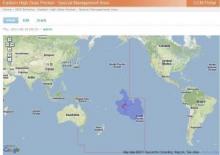Press Release - Eastern High Seas Pocket Special Management Area

Eastern High Seas Pocket Special Management Area
Fisheries Management and enforcement representatives from France and French Polynesia, Kiribati and the Cook Islands, as well as the Western and Central Pacific Fisheries Commission (WCPFC) Secretariat, met for the first time in Rarotonga today (20th June) to consider management and conservation measures to be applied to fishing vessels operating in the Eastern High Seas Pocket. This area of high seas, which is enclosed by the Cook Islands, Kiribati and French Polynesia, has long been considered a haven for illegal fishing activity affecting all three countries and their efforts to sustainably management shared fish stocks.
The measures, which include the requirement for vessels to be remotely tracked using satellite technology, and to provide reports of fish on board before entering and leaving the high seas pocket, are part of a Conservation and Management Measure (CMM) put forward by the Cook Islands, and adopted by the Western and Central Pacific Fisheries Commission at its annual session in Honolulu last year. The CMM establishes the pocket as a Special Management Area (SMA) and provides the adjacent countries with the right to continuously monitor fishing activity in that section of high seas. It is due to come into effect on 1 July 2011.
The WCPFC Secretariat representative, Mr Sam Taufao, briefed the meeting on how information provided by the fishing vessels to the Commission will initially be managed, and noted that further technical enhancements will be implemented to ensure full compliance by all fishing vessels. The issue of non-compliance (of vessels) was also discussed by the group and it was considered that the SMA partners would need to take a unified approach to this to avoid potential ‘corridors of access’ to from the high seas pocket.
SMA partners agreed on the need for higher levels of cooperation between them and considered ways that this might be achieved, including through on-going exchanges of information, personnel and joint surveillance operations. The finalization of their respective maritime boundaries was one such area identified for ongoing cooperation. The parties also agreed on the possibility of extending discussions in future meetings to cover a broader range of fisheries management issues, particularly where there may be other matters of shared interest by the group.

